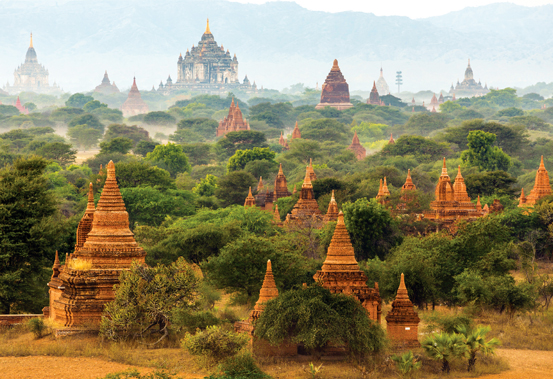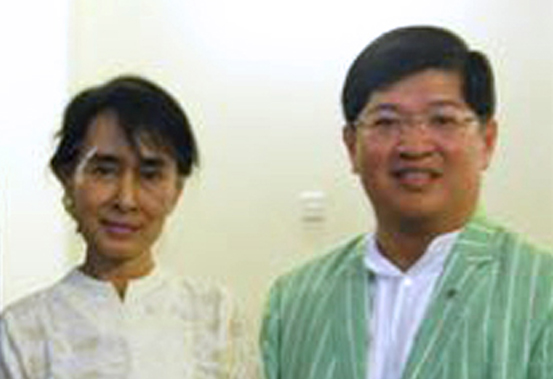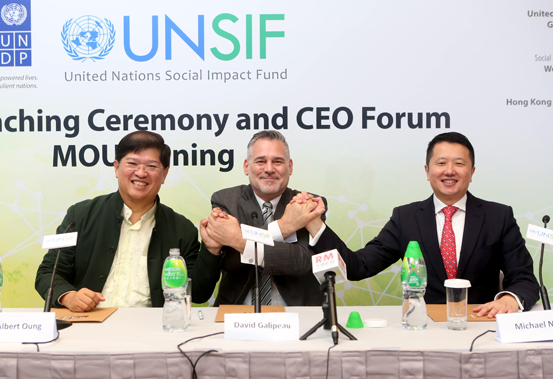Mr Albert Oung is Founding President of the World Green Organisation, and Founding Chairman of the Hong Kong Myanmar Chamber of Commerce. He is also a serial green entrepreneur with over 30 years of commercial and industrial expertise in transforming and commercialising business practices into sustainable and responsible models. Oung is currently a student on the College of Business EMBA. Here he talks about green initiatives in Myanmar, the land of his birth, his early inspirations, his anti-human trafficking work and what it means to be a green businessman.
Albert Oung is famous for walking the talk. And visitors to his office are implicitly invited to walk along with him. The World Green Organisation is headquartered in unassuming Lai Chi Kok, an area famous for godowns and factory outlets. The gate to the stairwell is the sort of dilapidated rusty grille typical of tenement buildings in the poorer parts of the city. And there is no lift. We walk to the fourth floor past garment warehouses. Upmarket this is not.
Inside, the World Green Organisation is painted green at every opportunity. We are shown into a windowless conference room. The air conditioner is not on. There are green sofas, green tables, green walls, and then Oung himself appears in his trademark green suit with a jungle coloured t-shirt beneath.
"This NGO has grown in two years to the sort of size that takes others twenty years," says Oung. Softly spoken, there is immediately a sense of spaciousness about him, as if he effortlessly carries the vast aspiration of his organisation in his person. Here, you sense, is someone capable of taking the long view.
It is stuffy. A bead of sweat trickles down Oung's cheek.
"I am like an alien," he says. "As a leader of the Green Party of Hong Kong, I meet Greens from all over the world, many of them working in politics or NGOs. But I am also a green businessman. And as a businessman I have to be prudential. To be successful, a product must have impact and be sustainable in the long term. It's about more than being environmentally friendly."
"When I started green in business, people would say, Hey that's not going to work! But that's all changed now"
Beyond styrofoam
One of Oung's early forays into green business was with a classic environmentally friendly product – a biodegradable food box to replace Hong Kong's ubiquitous styrofoam container.
Typically, he sees access to knowledge as key: "We have to reinvent our views of what is right or wrong first. With styrofoam there needed to be more information about the health hazards. We shared our experience and knowledge. That led to transformation. With styrofoam we were talking about cheap and easy. Now we are seeing the cost, the cancers. So we stop and we provide the replacement."
Made in Myanmar
The scope of green vision is also changing, and needs to be flexible:
"In the last ten or fifteen years we have been talking about global citizenship. We see things both from 20,000 feet above the sea, and we see things right here two feet away," he says.
Oung was born in Myanmar, a country he describes as peaceful, Buddhist, a place where people are kind and friendly. The government is also very keen on going green. Ever practical, he is Founding President of the Myanmar Chamber of Commerce in Hong Kong. And Myanmar, a late entrant to globalisation, has real choices ahead for its future development: "People in Myanmar know what is happening in the world. The Myanmar government doesn't want investors who are going to pollute."
Oung puts this in historical perspective.
"250 years ago when the first industrial revolution happened, nobody was talking about pollution, or equality, safety issues, customers rights, child labour, good manufacturing practices, corporate social responsibility, or fair trade, because they just didn't know. But now it's a different world. Now we must have a heart."
"We want 'Made in Myanmar' to mean something. It means responsible. It is a green brand. That way you attract like minds."
Albert Oung with Aung San Suu Kyi, State Counsellor of Myanmar
UNSIF Green Economy Fund
Oung is working directly with international organisations to further development in the region. The recently created United Nations Social Impact Fund (UNSIF) Green Economy Fund established by United Nations and Green Capital Group Limited will support the development of One Belt One Road related projects in Asia. The idea is that UN agency will partner with investors and corporations to facilitate social and economic development in the Asia Pacific Region. With an initial capitalisation of US$200 million, the fund aims to support successful and sustainable social business models. As Oung says:
"We are going to work with our partners to invest in areas like sustainable infrastructure, medical services and housing, clean energy, water, innovation and technology."
Albert Oung at the launching ceremony of the United Nations Social Impact Fund
Green Hong Kong?
How about governance in Hong Kong? Is it fit for purpose to deal with green issues? For all its efficiency and success, Oung sees that government by specialised departments can lead to fragmentation in policy making.
"There have been a lot of breakthroughs under the current administration, and I have been talking about turning Hong Kong into an international Green City."
"We need to start with the overview. We cannot deal with issues on a fragmented basis: Crossdepartmental cooperation within the government is important. It is not only the responsibility of the Environmental Protection Department. For example, waste handling is under the Food and Hygiene Department. Two departments must coordinate and communicate. The challenges now are that the priority and urgency are different among different departments and functions."
The Good Citizen
Environmental awareness is not new to Hong Kong.
"Way back in 1972 we had a Keep Hong Kong Clean Campaign. It was initiated by the government, and covered health issues, and being a good citizen. This campaign is still running!"
Beyond the framework of governance, individual attitude is key: "I have never been discouraged.
I don't fight back, I just reason out. We can change people's mindsets by being positive. And then people can become one of our comrades, not one of our followers."
There is a principled way forward:
"Hong Kong has the capability to influence the world. The number of industrialists may be in decline, but green entrepreneurship is on the rise. The only people who look down on Hong Kong are the Hong Kong people themselves! It's not only about Hong Kong, it's a world issue. It's fun to do green business, it's profitable, it's meaningful to commit. If every organisation is also a social enterprise, you can see how powerful it would be."
What is Green?
For most people Green = care for the environment. But Oung puts the concept in wider context:
"We talk about three things: Of course the environment, but also social issues and economic issues. We must address issues in a holistic way. We need to work scientifically, with a research base, and in a responsible manner. And we are fortunate that we now have international standards. Measurements can be calculated."
The trouble is with language itself.
"There are too many words these days and people get confused. So I think: How can we tell the world in a simple way? I try and reinvent this green word so it describes our attitudes as well as the issues."
Oung uses five international icons: A red heart, because you have the heart to do good things. A yellow happy face, so you do it in a happy way. A peace sign, which represents also peace of mind. The Ying Yang sign, for balance and environmental harmony. And finally the recycling sign.
"The mindset has been set to selfish. Green is positive thinking, restoring the correct values and doing the right thing."
"A lot of youngsters are talking about very imminent issues. We have to take a longer view. So I say, Don't throw away tomorrow. That comes from Pastor Dr Robert Schuller of the Crystal Cathedral. Let's start with that mindset."
Inspirational roots
Oung started his first green business 30 years ago. That was in agricultural waste and services, and educational programmes in Canada.
"In those early years a lot of my inspiration came from corporates like Roots. It's a Canadian apparel company established by two American hippies in the early 1970s. They produce environmentally friendly products, but they also do conservation projects, charity and community work, and they enjoy what they do. That is an inspiration! It made me think: investors can make money in ethical companies."
Oung started making biodegradable food containers with "Cradle to Cradle" product certification, the first Asian company to achieve this German global standard. Now his company's products use the "Cradle to Cradle" design, a biomimetic approach to the design of products and systems which are waste free.
Everyone plays a role
Oung publishes his first ecotourism book on Myanmar in June 2016. This is partly a brand-building exercise for Myanmar. But there are wider issues at stake, such as anti-human trafficking in Southeast Asia and Africa.
"When a country grows there are lots of complications. Young people have to be protected."
He is Founder of Green Hong Kong Foundation, to work against human trafficking. And Hong Kong is important precisely because it is a financial hub.
"Banks finance all kinds of businesses including those using child labour. The finance sector can play an important role by asking their customers not to work in these ways. So Hong Kong has a part to play in antihuman trafficking."
"I don't know if I can achieve it in my lifetime, but I am a very positive person. We must have that kind of heart. If I don't have that kind of heart it is so discouraging."
The Green Hotel
Ecotourism is about responsible tourism. It's about global citizenship. But it can also start close to home. Oung has planned to start Green Hotel project in Bagan, Myanmar. The architectural design, the raw materials, the software, the operations are all environmentally friendly. The Green Hotel will itself serve as a venue for environmental conferences, talking about ecotourism and job creation for the villages around Bagan archeological zone.
"Everything will be showcased in the basement of the hotel: waste management, food waste issues, drainage, water, sewage. And in the case of an emergency such as a natural disaster, part of the hotel will transform into a disaster relief centre."
Oung believes this Green Hotel can become a model for all hotels, and that ecotourism – as with all things Green – starts on our own doorstep.



